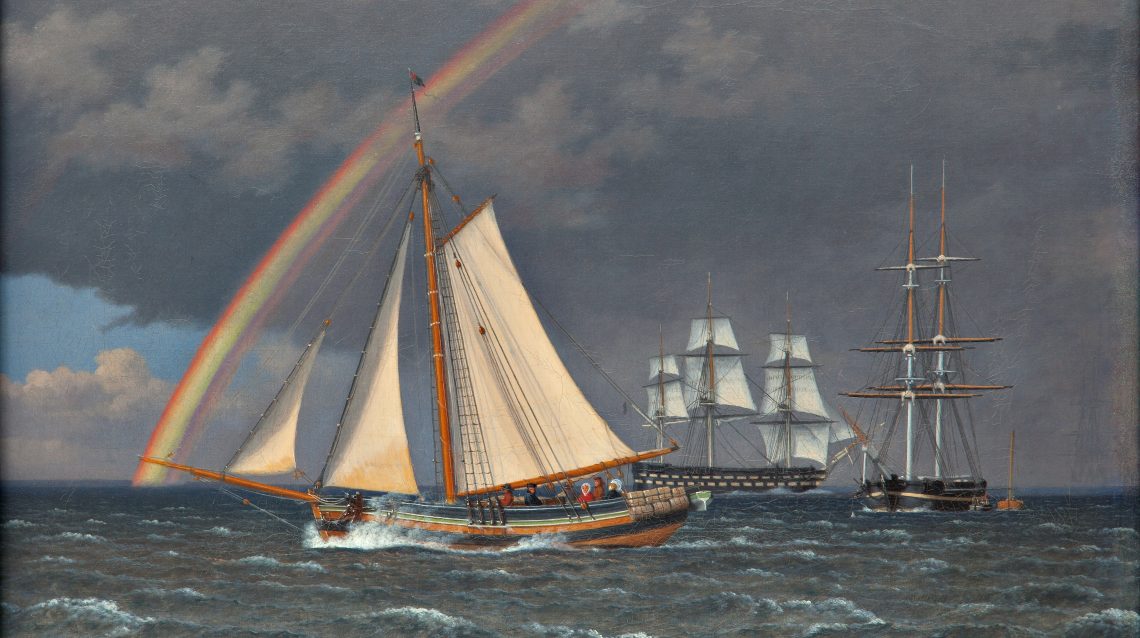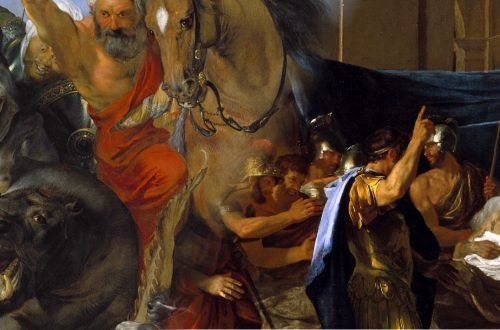by Bridget Donohue
Jesus raising Lazarus from the dead must have been a sight to behold. He was very, very dead. Six feet under as we would say today. For at least four days. The stone covering his tomb must have weighed, some say, a literal ton. It was firmly set in place. And Lazarus, wrapped up like a mummy, stunk to high heaven. Both of Lazarus’ sisters, Mary and Martha, blamed Jesus. “If you had been here,” they cried, “my brother wouldn’t have died!” Their beloved brother was gone and the only man they knew who could save him, wouldn’t and didn’t. Hope on all fronts was lost. Now was the time to mourn.
Or was it? Jesus had tried to give them hope. “It’s for the glory of God!” “It is so the son of God may be glorified!” Glory, Glory, Glory! Those triumphant words must have rung out like church bells throughout Lazarus’ home town of Bethany. But they fell on deaf ears and sorrowful hearts. Until…six days before the next Passover, there sat Lazarus, eating dinner with Mary, Martha, Jesus and a bunch of his disciples, as much alive at this feast as he was dead in the tomb just days before!! Can you imagine the double-take from those who had heard of his death but had not witnessed Lazarus walking from the tomb that day he was raised? Seeing him there, in the flesh, they must have begun, at least dimly, to glimpse the glory that Jesus talked of. Mary herself was so overwhelmed with the glory of God that she poured the most expensive of oils over Jesus’ feet and wiped them with her hair. Finally people were starting to see God’s glory.
Or were they? Some of the same people who despaired at Lazarus’ death were present at Jesus’ death, too. And Jesus cried “Glory!” even more fervently before his own death than he did before he raised Lazarus from the grave:
“Now my heart is troubled,” Jesus went on. “What am I going to say? ‘Father, save me from this moment’? No! It was because of this that I came to this moment. Father, glorify your name!” (John 12:27).
But Jesus’ friends fell to despair and confusion once again. Mary of Magdala wept at Jesus’ tomb. The disciples on the road to Emmaus said that they had hoped Jesus was the one who would save them, but now their hopes were dashed. The only quiet clarion call of “Glory!” was the Roman Centurion who stood at the foot of the cross and gasped, “Truly this was the son of God!” But who on earth could hear him? Even if his words had reverberated over the hill of Golgotha for all to hear, who would believe him – a Roman soldier?
During this Easter season, not just in America but all over the world, we are experiencing suffering and death the likes of which most of us have never before encountered. The long distance learning that schools are engaging in brings with it intense isolation. Many have lost not just their jobs, but much of their life’s savings. And worst of all, friends are falling ill and dying of the COVID-19 virus. And the virus threatens to continue causing more economic devastation and take more lives.
How should we as Christians engage these apocalyptic times? What should our response be to the cultural upheaval wrought by COVID-19? John’s Gospel (12:39-41) says that Isaiah saw the glory and thus said this to the unbelievers:
He has caused their eyes to be blind,
And caused their hearts to be hard;
So they wouldn’t see with their eyes,
Or understand with their hearts,
Or turn, so that I could heal them.
Are we destined to be blind to the glory because of our hard hearts, just as Isaiah prophesied? Or, dare we confront suffering and death with the hope that Jesus had? Dare we publicly hope, only to look like fools to those who ask why, if there is a God, would he allow all this suffering? Dare we sit at the bedside of our loved ones who are breathing their last breath and through our own tears, cry “Glory!”?
Perhaps the wiser question is, “Dare we not?” When Jesus was on his way to Jerusalem to die, he knew that this was the moment for which he was born. His time had come. His ship had come in. Jesus knew that if he did not cry “Glory!” right at that very moment that the Father’s victory over death would not be proclaimed throughout the world.
Dare we not live out our true vocations as Christians just like Jesus did? Dare we not point to God’s victory over death by crying “Glory?” Were we not born for this very moment in the year 2020 A.D.? Were we not born for COVID-19? Yes, our ship has come in! And just like some were confused when Jesus cried “Glory!”, so too might some of our friends and families be confounded. As Bob Dylan noted about all such moments unfolding in time:
And the words that are used
“When the Ship Comes In,” by Bob Dylan
For to get the ship confused
Will not be understood as they’re spoken
For the chains of the sea
Will have busted in the night
And will be buried at the bottom of the ocean
The whole wide world is still watching. But now they are watching for how we will respond to COVID-19. Among the confusion and despair, let us not merely pray to the Father that he save us from this moment. Let us say as we stand with Jesus that this is the very moment for which we were born.
Father, glorify your name!
For further insight into the title and content of the article, take a moment to listen to Bob Dylan’s When the Ship Comes In (lyrics here).

Bridget Donohue has been leading high school students in Scripture seminars for over 30 years. In her spare time, she enjoys simple yet elegant cooking, lots of hiking (Oregon’s Dog Mountain was a challenge), periodic snowshoeing in piles of lake-effect snow, biking the lonely Amish country roads of northern Indiana and horsing around with her puppy, Miss Maudie. She is the managing editor of Veritas Journal.
Header Image: “Rainbow at Sea with Some Cruising Ships (DETAIL)” (1836), by Christoffer Wilhelm Eckersberg. This image is in the public domain.






One Comment
Vince Scannella Jr
Listed – call me. 😊 V.S.